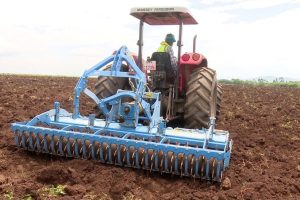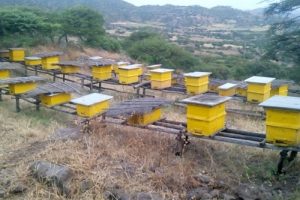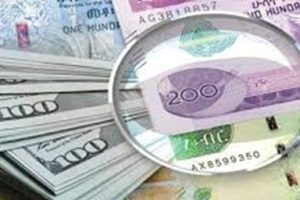
BY KFLEEYESUS ABEBE
Agriculture is a sector many countries dusted off their poverty; improved livelihood of their citizens and built on sustainable developement. But producing agricultural products with quality and quantity and marketing it with deserving price demand skill and labor. Africa having all the resources haven’t yet adequately benefitted due to lack of the modern systems of farming and selling products. Continental and international organizations hence stepped in to support respective governments and farmers effort of changing the system and making beneficeiry everyone involved in the sector.
Fairtrade Africa is one of these institutions engaged with policy makers, traders, cooperative unions, smallholder farmers to ensure quality and quantity in selected agricultural products. Kate Nkatha, Commercial directorate at Fairtrade Africa recounts organization’s journey of advancing quality and quantity of products, providing market access and improving livelihoods.
“During the last 17 years, it has transformed many lives of farmers. Currently, Fairtrade Africa is working to support 1.3 million farmers from 32 countries in Africa. Most of these farmers are in some of the key value chains like cocoa, coffee, tea, flowers, bananas and others across the region. And our work comes to increase the trade access for producers so that they can live, achieve a livelihood that they desire through the profitable trading of their crops,” Nkatha said.
Fairtrade Africa, however, has strong opinion that governments and unions must involve the voices of smallholder farmers in policy making so as to maintain and increase producitity, quality of coffee products and profitability of everyone in the chain. “In Fairtrade Ethiopia, we are supporting about 236,000 farmers and it will be a great catchment for the government to be able to get some insight directly from the farmers and from the corporates in terms of the benefits and the things that are working and not working. And then we work together in terms of improving,” Nkatha added.
The organization held a panel discussion and coffee contest recently aiming to bring key players in the sector together. Kate on the occasion suggested that coffee farmers could benefit from planting other crops alongside coffee or processing their raw materials. “For the producers also in terms of value addition, looking at beyond selling raw material, but also adding value, either fully processed or semi-processed products within that.”
Value addition and diversification of products have been chanted in the panel discussion as a means as to increase profit margin and to make farmers income sustainable. In the meantime, companies are emerging with interest of benefitting themselves and generating foreign currency for the nation by processing and exporting Ethiopian quality coffee. Roasting, packaging and other similar addition of value are being by encouraged by Fairtrade Africa and its partners.
The Netherlands Trust Fund V agribusiness through International Trade Center (ITC) for instance is rendering technical support to these emerging companies. National Coordinator Simachew Mekonnen said that the organization has been making interventions digitalizing the cooperative business, building market linkages for the coffee roastersas well as the cooperatives.
“One of the ITC interventions is value addition. As a country, we are exporting green coffee but if we add value like roasting, packaging and other kinds of value addition; farmers, unions, and governmet could be more benefitted. So, provding technical support and capacity building programs for these small and micro enterprises are our priority areas,” Simachew said. In terms of having large market access, hastening the implementation of CFTA – Continental Free Trade Area will be essential said Simachew Mekonnen from International Trade Center.
“ The agreement is already signed and its implmentation is eagerly being waited. It would be one major market for Ethiopian coffee. Ethiopia can trade with other African countries and certainly will be beneficiery since it has very unique type of coffee. That would mean the current 2 percent inter Africa market could substantially changed,” Simachew noted.
Another discussion point of the panel was the achievement of eco-friendly coffee production and how it should be sustained. Fairtrade Africa has been working with cooperatives and government offices. By implementing eco friendly coffee production. Oromia Coffee Farmers’ Union is generating income from emission reduction payments. Union’s general manager Dejene Dadi said that farmers have recognized dual advantage of preserving the ecosystem.
“We are earning income from carbon credit. So, farmers are getting additional amount money from carbon credit. We distribute 70 percent of the premium, around 8.5 Euro per metric tone, for the farmers. Now it is reaching around 100 euros. This is very attractive even when the farmers have off season for coffee maybe this the carbon trade replaces the income for the farmers,” Simachew added. Fairtrade Premium is extra sum of money coffee unions collect from increased and quality coffee production. This finance is being used for community services like road construction, library, health centers and other basic services.
The program also featured a contest among cooperative unions, coffee processors and exporters. Professional coffee testers tested coffee presented by different unions and announced the winner. Union which brought the distinctively floral and fruit-toned Yirgachefe Coffee is the winner and its general manager Erkyihun Woldegiorgis said the recognition can support their market penetration.
“It has direct implication to the farmers because it has the potential to determine prices. With cup of excellence competition, Ethiopian coffee hit record last year. Similar to that, we are also expecting this competition to affect the market, also increase the knowledge and also the motivation of our farmers, the staff at the union. It will increase the apetite to work more,” Erkyihun said.
Erkyihun went on elaborating the importance of such discussion and competition in coffee sector. “It is important to understand coffee production and selling needs constant investment, knowledge and experience sharing. All the time there is a change in the global market. We, as farming organization, need to involve in this kind of training so that we can maximize the benefit we get from coffee.”
Fairtrade Africa also called on the media to promote its work in transforming livelihoods and traders and retailers to adopt sustainable pricing models. Documents indicate that Ethiopia accounts for around 3 percent of the global coffee market and around 60 percent of Ethiopia’s foreign income generates from coffee. In 2022, Ethiopia had obtained a record-hit 1.4 billion USD from coffee export.
As people involved in the sector say, these are the results of encouraged producers providing larger volume of coffee with quality and value addition. Competition among producers, advancing the market chain, the diversification of products by giving support to farmers and unions can help this number jump further.
As long as these activities generate larger amount of foreign income, they can also change lives of people in coffee growing, processing and marketing. Currently, there are more than 15 million of the population relying on some aspect of coffee production for their livelihood, it was learned.
The Ethiopian Herald April 14/2023





